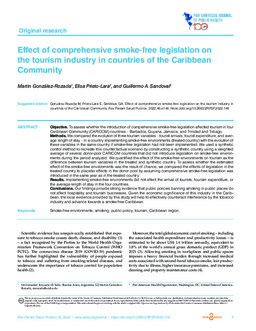Mostrar el registro sencillo del ítem
Effect of comprehensive smoke-free legislation on the tourism industry in countries of the Caribbean Community
| dc.rights.license | https://creativecommons.org/licenses/by-sa/2.5/ar/ | es_AR |
| dc.contributor.author | González-Rozada, Martín | es_AR |
| dc.contributor.author | Prieto-Lara, Elisa | |
| dc.contributor.author | Sandoval, Guillermo A. | |
| dc.contributor.editor | Pan American Journal of Public Health | |
| dc.coverage.spatial | Región del Caribe | es_AR |
| dc.date.accessioned | 2022-11-23T15:20:48Z | |
| dc.date.available | 2022-11-23T15:20:48Z | |
| dc.date.issued | 2022 | |
| dc.identifier.citation | González-Rozada M, Prieto-Lara E, Sandoval GA. Effect of comprehensive smoke-free legislation on the tourism industry in countries of the Caribbean Community. Rev Panam Salud Publica. 2022;46:e146. https://doi.org/10.26633/RPSP.2022/146 | |
| dc.identifier.issn | 1680-5348 | |
| dc.identifier.uri | https://repositorio.utdt.edu/handle/20.500.13098/11438 | |
| dc.identifier.uri | https://doi.org/10.26633/RPSP.2022/146 | |
| dc.identifier.uri | https://iris.paho.org/handle/10665.2/56463 | |
| dc.description.abstract | Objective. To assess whether the introduction of comprehensive smoke-free legislation affected tourism in four Caribbean Community (CARICOM) countries – Barbados, Guyana, Jamaica, and Trinidad and Tobago. Methods. We compared the evolution of three tourism variables – tourist arrivals, tourist expenditure, and aver- age length of stay – in a country implementing smoke-free environments (treated country) with the evolution of these variables in the same country if smoke-free legislation had not been implemented. We used a synthetic control method to recreate this counterfactual scenario by constructing a synthetic country using a weighted average of several donor-pool CARICOM countries that did not introduce legislation on smoke-free environ- ments during the period analyzed. We quantified the effect of the smoke-free environments on tourism as the difference between tourism variables in the treated and synthetic country. To assess whether the estimated effect of the smoke-free environments was the result of chance, we compared the effects of legislation in the treated country to placebo effects in the donor pool by assuming comprehensive smoke-free legislation was introduced in the same year as in the treated country. Results. Implementing smoke-free environments did not affect the arrival of tourists, tourism expenditure, or the average length of stay in the four countries. Conclusions. Our findings provide strong evidence that public policies banning smoking in public places do not affect hospitality and tourism businesses. Given the economic significance of this industry in the Carib- bean, the local evidence provided by this study will help to effectively counteract interference by the tobacco industry and advance towards a smoke-free Caribbean. | es_AR |
| dc.description.sponsorship | Pan American Journal of Public Health | |
| dc.format.extent | 1-8 p. | es_AR |
| dc.format.medium | application/pdf | es_AR |
| dc.language | spa | es_AR |
| dc.relation.ispartof | Rev Panam Salud Publica;46, oct. 2022. Special Issue Tobacco Control | |
| dc.relation.ispartof | Revista Panamericana de Salud Pública | |
| dc.rights | info:eu-repo/semantics/openAccess | es_AR |
| dc.subject | Smoke-Free Environments | es_AR |
| dc.subject | Smoking | es_AR |
| dc.subject | Public Policy | es_AR |
| dc.subject | Tourism | es_AR |
| dc.subject | Caribbean Region | es_AR |
| dc.subject | Ambientes Libres de Humo | es_AR |
| dc.subject | Fumar | es_AR |
| dc.subject | Política Pública | es_AR |
| dc.subject | Turismo | es_AR |
| dc.title | Effect of comprehensive smoke-free legislation on the tourism industry in countries of the Caribbean Community | es_AR |
| dc.type | info:eu-repo/semantics/article | es_AR |
| dc.type.version | info:eu-repo/semantics/publishedVersion | es_AR |
Ficheros en el ítem
Este ítem aparece en la(s) siguiente(s) colección(ones)
-
Artículos en Acceso Abierto
Publicaciones de investigadores ditellianos en revistas científicas

